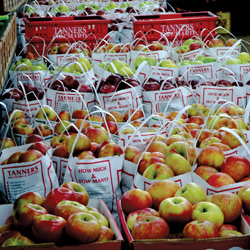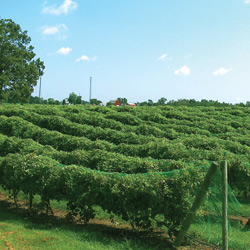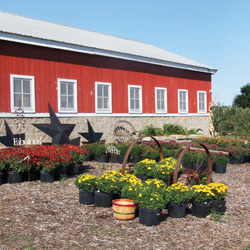Agritourism

Agritourism provides alternative revenue streams to farming operations and economic impact to rural communities.
Agritourism is a growing segment of the rural economy in many areas of Illinois. Many farm-based agritourism businesses that attract customers directly to the farm gate exist and are being developed throughout the state. These diverse businesses market a wide variety of produce, products and services to a wide variety of consumers who often value the experience of visiting a farm or rural area as much as the merchandise they purchase along the way.
What is Agritourism?
Agritourism is defined as any business activity that brings the public to a farm or rural setting in an effort to market farm-raised or produced products or the enjoyment of related outdoor activities.
Many times, agritourism includes small, local businesses found on the main streets of rural communities. These businesses that usually sell local products, antiques or offer a unique country experience, along with traditional agritourism enterprises located in the surrounding area, help to create a critical mass of attractions that can be more easily marketed to a wider variety of customers and entice those customers to travel a greater distance to visit several businesses rather than just one. An Economic Development Tool
An Economic Development Tool
Agritourism is becoming an economic development tool for many rural communities.
In a research report published by the Illinois Institute for Rural Affairs and co-authored by Bruce Wicks, University of Illinois Extension, and Christopher Merrett, Western Illinois University, a number of interesting factors concerning agritourism as an economic development tool were addressed.
While no single definition is widely recognized, agritourism is a hybrid concept that merges elements of agriculture and travel/tourism to open new profitable markets for farm products and services and provide travel experiences for a large regional market. Although agritourism is unlikely to ever be the dominant sector of agriculture in most areas of Illinois, it may play a significant support role for many agriculture enterprises, especially where direct marketing is concerned.
At the foundation of marketing is the need to give the consumer what he or she wants for a price that is acceptable to both the buyer and seller. Although many people involved in agritourism continue to focus on the commodity grown or raised, the real issue is fulfilling the motives of the traveler.
It may surprise some product-focused producers that, in many cases, the cost of the product sold to the traveler is almost irrelevant. A family going to a fall pumpkin patch is likely to buy a jack-o-lantern or gourd, but what they really purchased was a family experience, and the real value of that experience may far exceed the cost of the pumpkins. Not only is that grower benefiting from direct marketing by selling at retail prices or  above, they are not competing with other producers on price. This is a completely foreign concept in most agriculture-related markets.
above, they are not competing with other producers on price. This is a completely foreign concept in most agriculture-related markets.
For farmers and other rural landowners, there are many agritourism options that may be considered. For those with an interest in developing such an enterprise, the Merrett/Wicks report suggests this five-step process.
- Create an idea. The starting point is to generate an idea for a new enterprise that has potential for travelers and other markets. New and creative ideas can be difficult to generate, especially if one is not accustomed to thinking outside of the production-oriented mindset. Critical assistance for developing an idea may be obtained from friends or family members, or agencies like the University of Illinois Extension, Illinois Farm Bureau, Illinois Department of Agriculture or the USDA. Joining organizations such as Specialty Crop Growers or the Direct Farm Marketing Association, as well as visiting established agritourism destinations is also suggested.
- Develop a business plan. The business plan will tell us if the idea is a good one and lays out the plan to achieve the goals of the business opportunity.
- Examine available farm/land resources. Be sure that physical resources can support the proposed activity. Lack of space, poor location, road access, proximity to neighbors, soil attributes and available wildlife habitat may limit or accentuate the viability of a particular agritourism idea.
- Conduct a risk assessment of the proposed agritourism endeavor. Depending on the type and location of an agritourism enterprise, there may be a range of liability, licensing and zoning issues that must be addressed prior to inviting tourists onto your property. Parking, bathroom facilities, adequate shelter in the case of inclement weather, food preparation requirements, access to livestock or moving farm equipment are also factors that might be of concern.
- Critically look at yourself and/or your team. Agritourism enterprises are not for everyone. Having visitors on your farm on their terms or schedule may totally disrupt your lifestyle. New revenues are great, but if you or your family are miserable as a result, is it worth it? In many cases, others can do tasks we are not particularly well-suited for. A family member or employee might assume that responsibility; you need not do it all alone. The big challenge with this step is admitting we may not have all the needed skills and having enough sense to know that we need help.
Some general suggestions to prospective agritourism entrepreneurs are:
- Remember, this is not a “big farm/small farm” issue. Successful agritourism businesses are operated on farms of all sizes and by people of all experience levels.
- Develop a plan. By developing clear goals and communicating them to everyone involved (family members, employees, bankers, etc.) there is a much better likelihood of actually achieving those goals. The list of activities involved with operating a successful agritourism business is endless. Keeping “busy” will not be a problem; however, prioritizing and getting the right things done at the right time will be critical to business success.
- Keep profit in mind. Running a business is different from participating in a hobby.
- Look for and explore every opportunity to develop partnerships. There are a variety of resources available that can assist with the development and marketing of your business, but they must be made aware before they can help you. Search the web, make phone calls, send emails, join associations and attend workshops. Some area businesses that might initially appear to be competitors can turn out to be the best partners in the long run.
- There are no “silver bullet” solutions. Depending on experience, management ability, location, financial resources and a variety of other factors, no two agritourism enterprises are the same. The opportunity for success at some level is always present. It is up to the individual to capitalize on their strengths and overcome their weaknesses to develop their own niche in agritourism.
Thinking of starting an agritourism business? Visit web.extension.illinois.edu/agritourism for additional ideas and tips for developing or expanding an agritourism enterprise. iBi
John Pike is an extension educator with the University of Illinois Extension in Marion, Illinois. He can be reached at jpike@illinois.edu. This article was adapted from material on the University of Illinois Extension Agritourism website.

